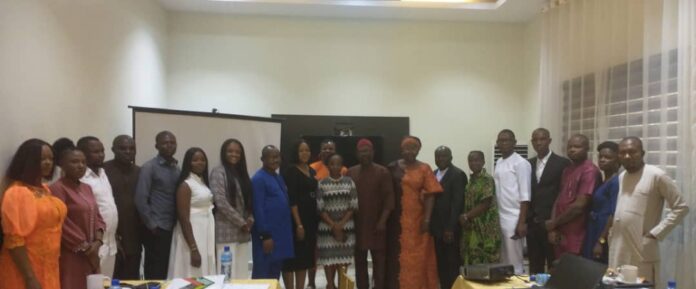Despite invitations extended to them, neither the Governors of the five Southeast States nor their representatives were absent on Thursday, when critical stakeholders converged on Awka, Anambra State Capital, to discuss and find solutions to the shrinking civic space in the region.
The event was a dialogue session organized by the Rule of Law and Accountability Advocacy Centre, RULAAC, under its 2025 Civic Space and Security Project.
Titled ‘Voices Unchained: A Journey Through Civic Space in Southeast Nigeria,’ the dialogue is supported by the Fund for Global Human Rights through a Sub-grant from the Action Group on Free Civic Space (AGFCS), and had as it participants, grassroots advocates, legal practitioners, journalists, community leaders, and policy influencers.
It seeks to engage, educate, and empower stakeholders across the Southeast to strengthen civic space, promote accountability, and protect democratic freedoms.
In an opening remarks, the Executive Director of RULAAC, Mr Okechukwu Nwanguma, represented by Mrs Onyinyechi Nwosu said the project builds on the momentum of RULAAC’s 2024 initiative and the documentary ‘Silenced Gongs,’ which gave voice to the lived experiences of individuals, communities, and groups whose rights to speak, organize, and participate in governance have been undermined.
He revealed that the dialogue is aimed at providing a platform for open, inclusive conversations about the state of civic space in Southeast Nigeria, highlighting both challenges and opportunities, as well as to screen and reflect on the documentary “Silenced Gongs” as a tool for advocacy, public awareness, and mobilizing action to protect civic freedoms.
He also said the event targets to engage key stakeholders, including civil society organizations, media practitioners, lawyers, public officials, and affected communities, in identifying practical strategies for defending freedom of expression, association, and assembly.
“We also want to connect victims of civic rights violations with trained pro bono lawyers for potential legal redress and empowerment to pursue justice, and strengthen alliances and networks that can promote accountability, protect human rights defenders, and ensure that democratic space is preserved and expanded.
“We are all reminded that civic space is not a gift from the state. It is a fundamental right, guaranteed by law and sustained by the active participation of the people.
“We cannot afford to be passive in its defence,” he said.
In a presentation, the Director, Institute for Peace, Security and Development Studies (IPSDS), Nnamdi Azikiwe University, Awka, Prof Jaja Nwanegbo, noted that the Southeast is historically known for its vibrant intellectual life, entrepreneurial energy, and political consciousness.
He cited town hall meetings, market-square debates, campus discussions, church and worship place gatherings, and local newspapers as evidence of safe spaces for opinion-sharing, which reinforce good governance and business confidence.
“A Southeast where journalists operate out of fear or where public criticism is met with intimidation is a Southeast that risks economic stagnation and social unrest.
“Southeast’s path to a vibrant civic space will not be built solely on paper laws but on the consistent, principled enforcement of those laws and the courage of citizens to claim their voices,” he said.
Nwanegbo suggested review and clarification of laws, strengthening judicial remedies, safeguarding of press protections, and strengthening of civic education activities as means of strengthening freedom of expression in the region.
During a plenary session, a panelist, Barr Chukwuemeka Okite observed that thinner public debate engenders fewer investigative pieces, reduced oversight where reporters and CSOs fear legal or physical retaliation.
This he noted, results in poor youth participation in governance and normalization of the culture of impunity.
Also contributing, a legal practitioner, Barr Chekwube Ezekwike noted that the Constitution and supporting legislation like the Administration of Criminal Justice Act (ACJA) of 2015 and state-level Administration of Criminal Justice Laws (ACJL) provides a robust theoretical foundation for protecting fundamental human rights, including freedom of expression and assembly.
She however, observe that the challenge is with the implementation of the laws, with many state actors complicit in the violation of the citizens’ rights.



